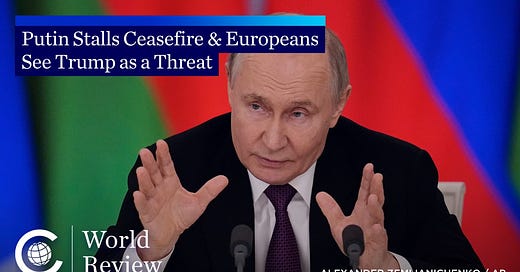World Review: Putin Stalls Ceasefire & Europeans See Trump as a Threat
A brief synopsis of this week's show
Each Friday morning, I host a video podcast called “World Review with Ivo Daalder” where three journalists from major news outlets around the world join me to discuss the latest global news stories of the week.
This morning, March 14, we discussed the latest on Ukraine and Europe’s effort to reduce its dependence on the United States. We had also planned to discuss the gutting of USAID, but ran out of time. Joining me this week were Susan Glasser of The New Yorker, Anton LaGuardia of The Economist, and Philip Stephens of the Financial Times.
“World Review is always fascinating. I love the fact that you can get journalists from around the world to participate since zoom is the medium.”
— A Subscriber to America Abroad
While I encourage you to watch or listen to the episode (and subscribe wherever you get your podcasts!), here are a few interesting things I took away from our discussion:
At the beginning of the week, U.S. and Ukrainian negotiators met in Saudi Arabia and agreed to propose a 30-day ceasefire to take effect as soon as Moscow agreed. “The ball is now in Russia’s court,” Secretary of State Marco Rubio declared. Yesterday, Vladimir Putin kicked the ball firmly back into the Oval Office. A ceasefire is a “good idea,” he said, but it had to be tied to a lasting peace, which could only happen by resolving the “root causes.” For Putin, the root cause is the very existence of Ukraine. So what will Trump do now? The answer in normal times would be to increase pressure on Russia—tighten sanctions and provide more aid to Ukraine. But these aren’t normal times and Trump is more interested in having a good relationship with Putin’s Russia than he is in finding a just resolution to the war. That much is clear from the last few weeks of diplomacy. Trump, Anton argued, is so far failing the test of ending the war, which he promised to do in 24 hours. It wouldn’t be surprising if a few weeks from now, given Russian stonewalling, Trump quietly abandons the effort to secure a peace and turn his attention elsewhere—much as he did with North Korea in his first term after failing to secure a breakthrough in any of his three meetings with Kim Jong-Un.
Beyond Ukraine, the bigger question is how serious to take Donald Trump these days. The president likes to keep people guessing—saying this and that to keep people of balance. But what’s pretty evident in this second term, Susan suggested, is that Trump is following a predictable path. He wants good relations with Russia. He’s taken Moscow’s side in the war—repeating Putin’s talking points that Ukraine started the war, Ukraine will have to give up territory and accept it won’t be able to join NATO, will have to hold new elections, and will have to pay the United States for military aid it has so far provided. There is no indication he will pressure Putin to change course. While everyone is saying Trump is trying to get to peace, the reality is he’s trying to please Putin—peace or no peace.
Meanwhile, Europe seems to have taken Trump’s measure. European politicians and diplomats, Philip reports, are talking about the need to “de-risk” their relationship with Trump’s America—a term first developed by Europeans to describe the changing economic relationship with China. For decades, Europe has depended on the United States for its security—integrating its armed forces into the US-led NATO alliance, relying mainly on US nuclear weapons for deterrence, and buying American military gear to be interoperable with the US military. Indeed, Washington long insisted that allies do just that. But now this dependence, long seen as a strength, has become a vulnerability, with some worrying that the United States can use its control over Europe in nefarious ways. So they are looking to “de-risk”—buying European weapons Washington cannot control and creating more independent capabilities in order no longer to depend on the United States.
For many in Europe, Trump is now seen as a threat almost on a par with Putin. Indeed, a new YouGov poll shows that 78% of Brits (and 75% of Spaniards, 74% of Germans and 69% of Frenchmen) see Trump as a threat to their security. Eightynine percent of Brits see Putin in the same light. Many in Brussels now speak of the twin threat to their security, meaning Moscow and Washington, rather than Moscow and Beijing. It’s an astonishing turnaround, unthinkable for 80 years, which reflects Europe’s realization that Trump is more interested in good relations with Russia than he is in bolstering allies or alliances.
That’s it for my quick takes of this week’s episode here on America Abroad. To get the full flavor, please listen to the episode itself.






I wonder if you have already decided to leave the US as you floated during your speech in Amsterdam. We can use you here in the Netherlands!
Ivo writes, "For many in Europe, Trump is now seen as a threat almost on a par with Putin."
Ok, to address these fears, let's go ahead and pull all American forces out of Europe so that Trump will no longer present this threat to Europe. We in America apologize for terrorizing Europeans for so long, and will now remove ourselves from your continent so you'll have only Putin to worry about.
You're on your own kids, good luck!